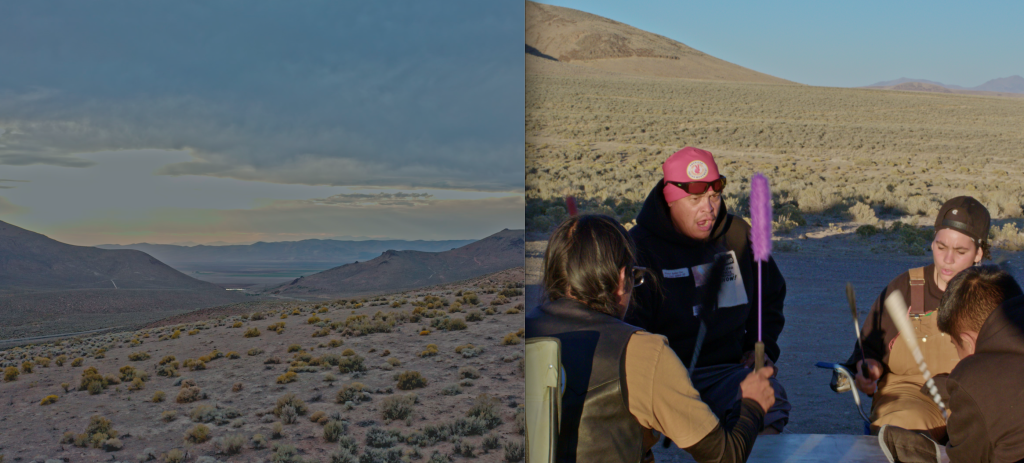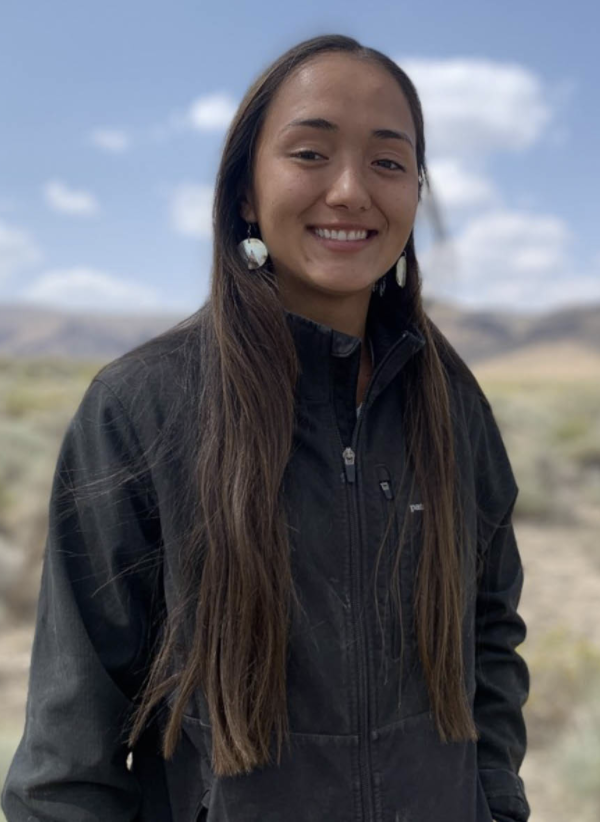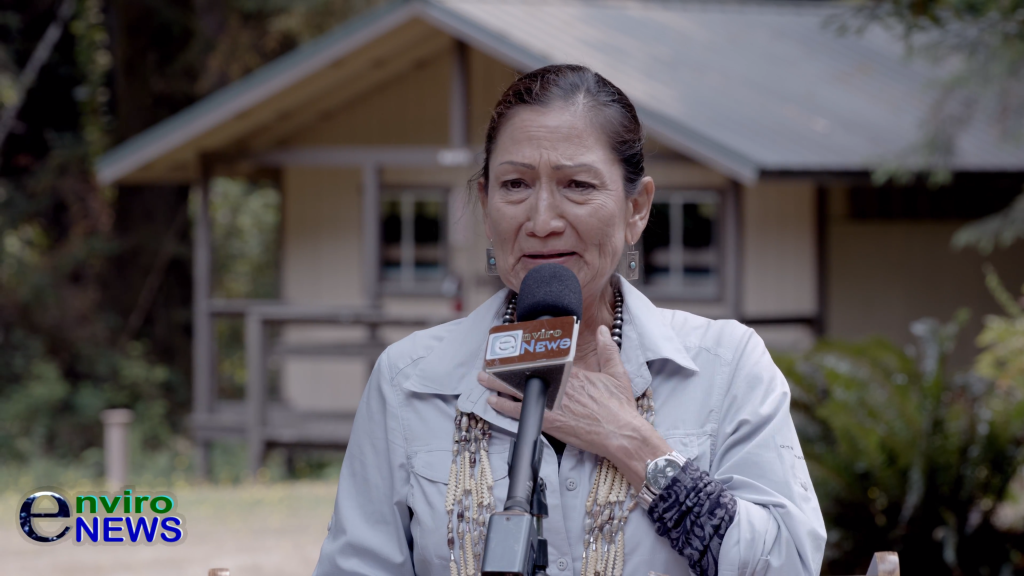Lithium Wars: Legal Actions Fly, 24/7 Protest Encampment Continues at Thacker Pass; Lithium Nevada Corp. Prepares to Break Ground

(EnviroNews Nevada) — Oravado, Nevada — New complaints have been filed by the Reno-Sparks Indian Colony and a Northern Paiute group known as People of Red Mountain in their federal lawsuit against the Bureau of Land Management (BLM). The case aims to thwart plans for a large-scale strip mining operation in the Thacker Pass area of Northern Nevada by Lithium Nevada Corporation. Court filings from November 29, 2021, allege the BLM violated a number of federal laws when it permitted the mine.
The BLM issued its Record of Decision (RoD) on what was former President Donald Trump’s final Friday in office back in January, following an “11th hour decision” by the Department of the Interior (DOI/Interior) to approve the mine, according to the Associated Press (AP). Lithium is considered an essential element for rechargeable batteries in laptop computers, cellphones and electric vehicles. Thacker Pass would be only the second commercial lithium mine in the United States, following another in central Nevada.
Attorney Will Falk, part of the legal team representing the plaintiffs, says newly discovered documents have revealed multiple violations of federal law that were previously unknown. “Among dozens of other outrageous violations, it is now clear that the BLM conducted no consultation with native tribes when permitting the Thacker Pass mine. None whatsoever,” Falk lamented in a press release.
The court filings allege violations of the National Historic Preservation Act, the Archeological Resources Protection Act, the Administrative Procedure Act, the Native American Graves Protection and Repatriation Act, and the National Environmental Policy Act (NEPA). Falk and his team also accuse the BLM of failing to properly identify Native tribes that believe Thacker Pass to be important. They also say the BLM didn’t identify well-documented culturally significant sites, and proceeded with permitting the mine in a flagrant disregard for the agency’s own internal rules that require consultation with tribes.
The BLM has insisted it had no previous knowledge of the area’s historical significance, and declined an opportunity to comment to EnviroNews earlier this fall about the pending litigation. But the recent legal filing indicates otherwise by documenting how former Fort McDermitt Tribal Chairman Dale Barr informed the BLM in March 2009 that the area was of historic importance, based on oral histories of an 1865 massacre that Tribal member say included dozens of Paiute men, women and children at the hands of the U.S. Cavalry.
“For months, BLM has been pretending [it] had no idea that Thacker Pass was culturally significant,” Falk said in a press release. “These new documents show this is a blatant lie. BLM has no excuse for not knowing that Thacker Pass is incredibly important from a religious and a historical perspective, and yet [it is] still planning an illegal for-profit archeological dig.”
In an email to EnviroNews, Falk said the Reno-Sparks Indian Colony and People of Red Mountain are seeking to add new arguments based on their review of the Administrative Record and that this could potentially delay a ruling for months.
Falk and his associate Max Wilbert co-founded the Protect Thacker Pass Land Defense Camp in January 2021 in an effort to block the company from breaking ground. Protestors have been camping on the site 24/7 in watchdog fashion for nearly a year, and now, Falk and Wilbert are being pursued by the BLM for an alleged $50,000 in trespassing fines.

Public relations officials from the Lithium Nevada Corporation said in an email to EnviroNews that concerns about lands that are sacred to Native American peoples are valid and suggested the company has a plan to address these issues.
“We take concerns about sacred lands seriously — being a good neighbor is important to us; further, we are committed to working closely with the Fort McDermitt Paiute Shoshone Tribe who will monitor the work and ensure artifacts are protected and preserved,” Tim Crowley, the company’s Vice President of Government Affairs and Community Relations, said in an email.
The Lithium Nevada PR team also indicated that management has pledged to halt operations if the remains of any human bodies are found. They added that 40-plus tribal members have expressed interest in working at Thacker Pass and that at least 15 members participated in a recent heavy equipment operator training and certification.
“We’ve enjoyed getting to know so many within the Fort McDermitt Tribe, and throughout Humboldt County, in support of Thacker Pass,” Crowley told EnviroNews. “We believe there is majority support [within the Tribe] and we’re eager to continue our productive conversations about how we work together.”
Activists on the ground however, find Crowley’s belief questionable. 23-year-old Daranda Hinkey co-founded an additional protest camp at Thacker Pass earlier this year after she learned of the site’s history. She’s a founding member of People of Red Mountain — an organization formed by members and relatives of the Fort McDermitt Paiute and Shoshone Tribe who want to stop the mining project from taking place in a location where they believe their ancestors were killed in the aforementioned cavalry massacre. She’s also the great-great-great granddaughter of Ox Sam – the man believed to be the only adult survivor of the 1865 atrocity. Hinkey takes issue with Lithium Nevada’s claim that there’s “majority” support within her Tribe for the Thacker Pass mining project. In an interview with EnviroNews, she said:
That’s complete bullshit… I truly don’t understand why Lithium Nevada and Tim Crowley are gaslighting this whole situation with the Tribe… People are saying no.
Hinkey says she hasn’t seen or heard anything about work applications or surveys from Lithium Nevada to collect tribal opinion on the Thacker Pass mining project.

Hinkey holds a degree in environmental science from Southern Oregon University and also takes issue with lithium mining being billed as a “green” or “clean” alternative to fossil fuels. She noted the Thacker Pass project will reportedly use sulfuric acid to strip lithium deposits out of clay, which, according to the New York Times, will generate hundreds of millions of cubic yards of mining waste and discharge.
The project’s permit documents indicate the company’s waste may also contain radioactive uranium, which harkens back to the nearby massive EPA Superfund site left behind by Anaconda Copper strip mine where a Shoshone-Paiute community’s water supply was contaminated with uranium tailings after that company wound up bankrupt and defunct.
Hinkey feels that members of her tribe who have bought into the mining project haven’t been made aware of the long-term ramifications. In her interview with EnviroNews, she continued by saying this:
It shouldn’t be called green, it shouldn’t be called clean… I still don’t think they understand the true environmental impacts and harms, not only for this generation but for the generations forward.
Falk says that communities have very little legal power in the United States to stop such projects due to the General Mining Act of 1872, in which Congress deemed mining to be the best use of public lands. He says that even if the plaintiffs win their case, Lithium Nevada and the BLM will just go back to the drawing board to correct their original mistakes in the permitting process and then try again. Falk summarized the situation thusly:
In these kinds of cases, when we win, it’s simply a stay of execution for the land. When corporations win, the destruction of the land is forever.
When queried on whether the Biden Administration could be expected to take a more favorable view of Native American rights than the Trump regime did, Falk’s response was negative. In an email to EnviroNews, he continued:
It does not appear that the Biden Administration cares about Native American rights when lithium for electric cars is at stake. The Biden Administration sold its soul to so-called “alternative energy” and the corporate devil the Biden Administration sold its soul to is not going to tolerate delays for tribal consultation.
Many environmentalists and Native American stakeholders have hoped that Secretary of the Interior Deb Haaland would be an advocate for their causes as the first Native American to serve as a Presidential Cabinet secretary. But Falk says that to his knowledge, Haaland has made no comment on Thacker Pass despite being lobbied to do so.
Hinkey said she believes that Haaland is in a difficult position due to the Biden Administration’s efforts to support energy projects that can help transition the country away from fossil fuels. “I honestly think that she wants to reach out, but her hands are tied with the Biden Administration wanting to move to green energy [with electric cars],” Hinkey concluded.

Crowley told EnviroNews the company is “working to break ground and begin a 20-month construction process next year,” though he did not offer more specifics as to exactly when work would begin.
Controversy over Conflicts of Interest and Secrecy in the Permitting Process
In October, the Associated Press reported on how the BLM relied on so-called “third-party” hydrologist Tyler Cluff to prepare 1,300 pages of studies for the mining project’s environmental impact statement (EIS) despite the fact that Cluff is also a paid consultant for the Lithium Nevada Corporation. Terry Lodge, another member of the plaintiffs’ legal team, said in a press release that such “unethical” behavior is all too common in the environmental consulting industry. Lodge said this:
These supposedly ‘independent’ contractors make money by working for both the government and corporations at the same time… It could not be clearer that BLM and Lithium Nevada are working together to manipulate and abuse the public, the tribes, and wildlife.
The proposed Thacker Pass lithium mine would be a 28-square-mile project centered on an 1,100 acre open-pit. The area currently serves as a habitat for bighorn sheep, pronghorn antelope, mule deer, sage grouse, golden eagles, burrowing owls, pygmy rabbits, migratory birds, and numerous other species that could be threatened by the project. The Nevada Department of Wildlife (NDOW) has expressed concern over how the project could harm wildlife as well as ground and surface waters, while the Environmental Protection Agency (EPA) has also warned of groundwater pollution danger from the mine.
FILM AND ARTICLE CREDITS
- Greg Schwartz - Journalist, Author



